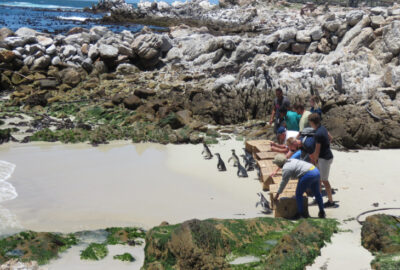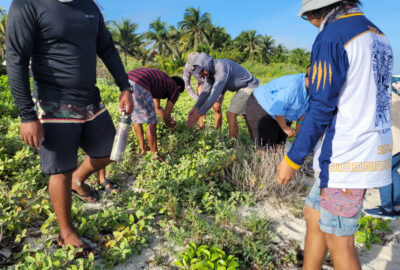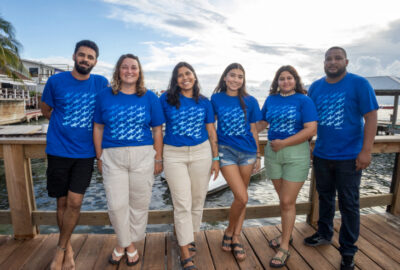Reflections on the 7th International Marine Conservation Congress in Cape Town, SA
The Aquarium’s Marine Conservation Action Fund team members share their experience attending the largest conference for ocean conservationists in the world.
By New England Aquarium on Wednesday, November 13, 2024


Last month, two of our Marine Conservation Action Fund (MCAF) team members—Program Manager Emily Duwan and Program Officer Christina Janulis—traveled to Cape Town, South Africa for the 7th International Marine Conservation Congress (IMCC7)! At the conference, Emily and Christina shared MCAF’s practices in trust-based philanthropy, connected with MCAF community members presenting their work, and met practitioners from around the world interested in MCAF opportunities. They also visited the Southern African Foundation for the Conservation of Coastal Birds (SANCCOB), which MCAF supported this past summer to rescue, hand-rear, and release critically endangered African penguin eggs and chicks—a popular species on exhibit at the New England Aquarium. Continue reading to hear from Emily and Christina on their experience!
What is IMCC?
Hosted by the Society for Conservation Biology (SCB), IMCC is the largest conference for ocean conservationists in the world. Over 800 scientists and practitioners gather every two years to share research, tools, and lessons learned with the goal of advancing marine science and policy.
What were our goals for the conference?
We were excited to share our work and connect with the global community at IMCC7, especially with those who were interested in our granting program and open call for MCAF fellows launching later this month. We represented the Aquarium at a booth with information on MCAF’s Fellowship and Granting Programs as well as the Aquarium’s conservation learning, sea turtle rehabilitation and rescue program, and ocean technology accelerator (BlueSwell) programs.

Before conference programming began, we participated in an enlightening focus group workshop titled, “Further discussions on Ocean Equity and Justice in Marine Research.” The original discussion was inspired by “Towards equity and justice in ocean sciences,” a paper published in npj Ocean Sustainability last year by Oceanswell Founding Executive Director and MCAF Fellow Dr. Asha de Vos and five co-authors. The IMCC workshop, co-led by Dr. de Vos, explored a few less-discussed themes from the paper, including passion exploitation and increasing access to the ocean and ocean research. We were grateful to learn from the other participants and be a part of conversations that stemmed from a publication with such critical ideas to consider. This session was designed as a starting point for the creation of resources and guides to address these issues, and we greatly look forward to continued conversations!
Throughout the conference, we had the opportunity to meet many global conservation leaders interested in MCAF, as well as like-minded practitioners in ocean philanthropy. The highlight of the trip, however, was connecting with members of the MCAF community in-person and seeing them present their exciting work!
What were MCAF community members presenting?
We were excited to attend the talks of five MCAF community members at IMCC: Sarah Ater, Yolanda Sánchez, Dr. Issah Seidu, Dr. Asha de Vos, and Dr. Rima Jabado. They spoke on a range of topics, from sharks and deep-sea exploration to ocean literacy and diversity, equity, and inclusion (DEI) in marine conservation.
SCB Marine Program Board Member and MCAF Project Leader Sarah Ater—who also served as the safety officer for the conference—spoke about ways to make the field of marine science more welcoming and accessible for all. She posed important questions like how to bridge long-term systemic barriers in financing, technology, and social capital, and offered guidance on how to practice DEI in our day-to-day lives. Her ethos: treat others with kindness.
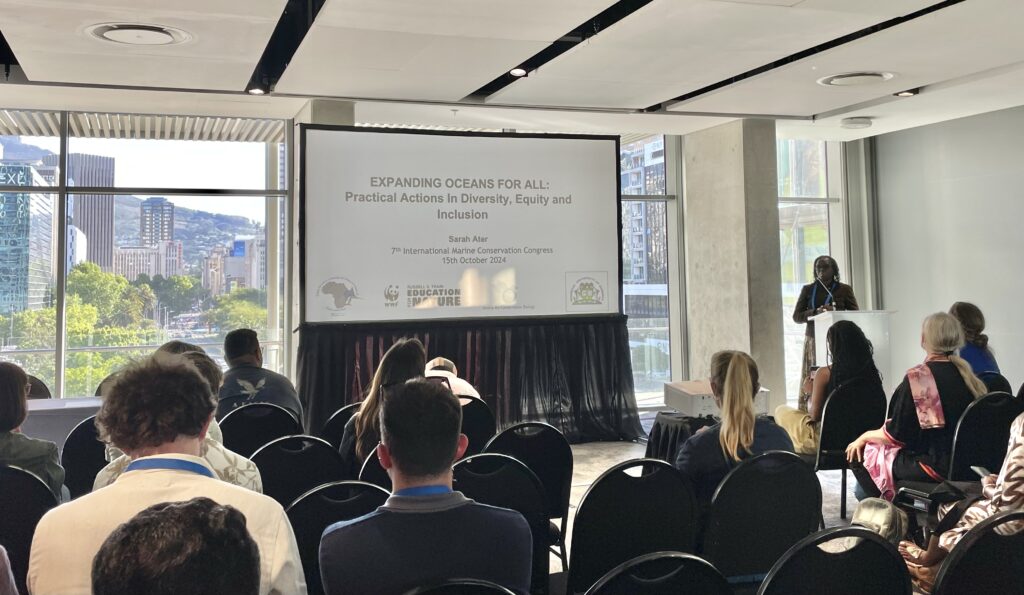
Latin American Education Network for the Ocean (RELATO) co-founder and MCAF Project Leader Yolanda Sánchez shared her experience developing and implementing an educational program for youth in Cape Verde. She emphasized the importance of self-empowerment in ocean literacy, which she achieved in this case by building trust, helping youth build teamwork skills, and letting them take the lead.
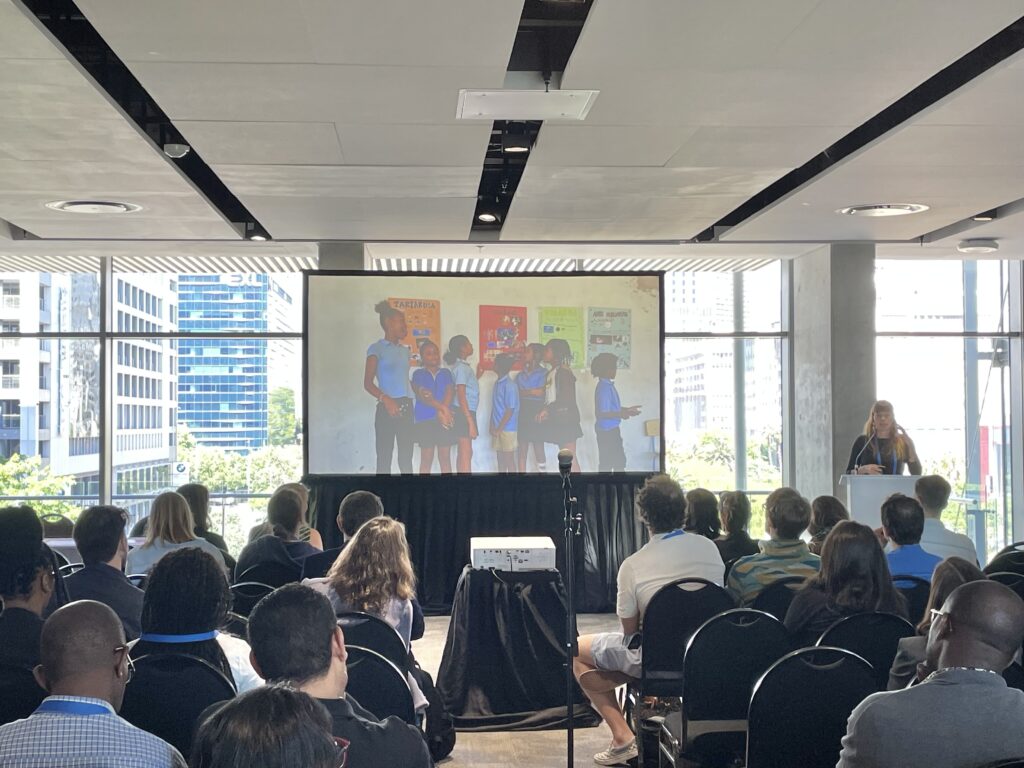
AquaLife Conservancy Founder and MCAF Fellow Dr. Issah Seidu presented his results from surveys of artisanal shark, ray, and guitarfish fisheries in Ghana and interviews with 51 fishers. Issah’s findings confirm the disappearance of sawfish (Pristis species) and declines in guitarfish (Rhynchobatus luebberti) in Ghana, due to international and local trade of fins and meat. His study serves as an important baseline for monitoring future changes in these fisheries.
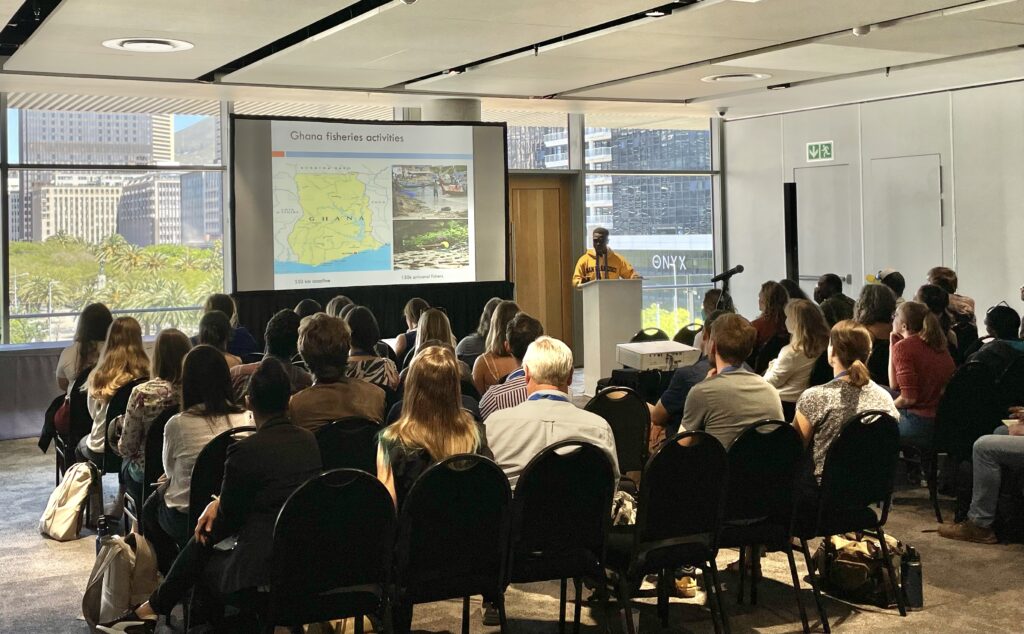
Oceanswell Founding Executive Director and MCAF Fellow Dr. Asha de Vos shared her experience deploying a National Geographic low-cost deep-sea camera system for the first-ever exploration and characterization of Sri Lanka’s deep sea. Dr. de Vos and her team not only found at least five species previously undocumented in Sri Lankan waters in over 18 hours of footage, but also demonstrated the value of innovative, easy-to-use technologies for locally led, deep-sea research that typically requires extensive high-cost infrastructure.
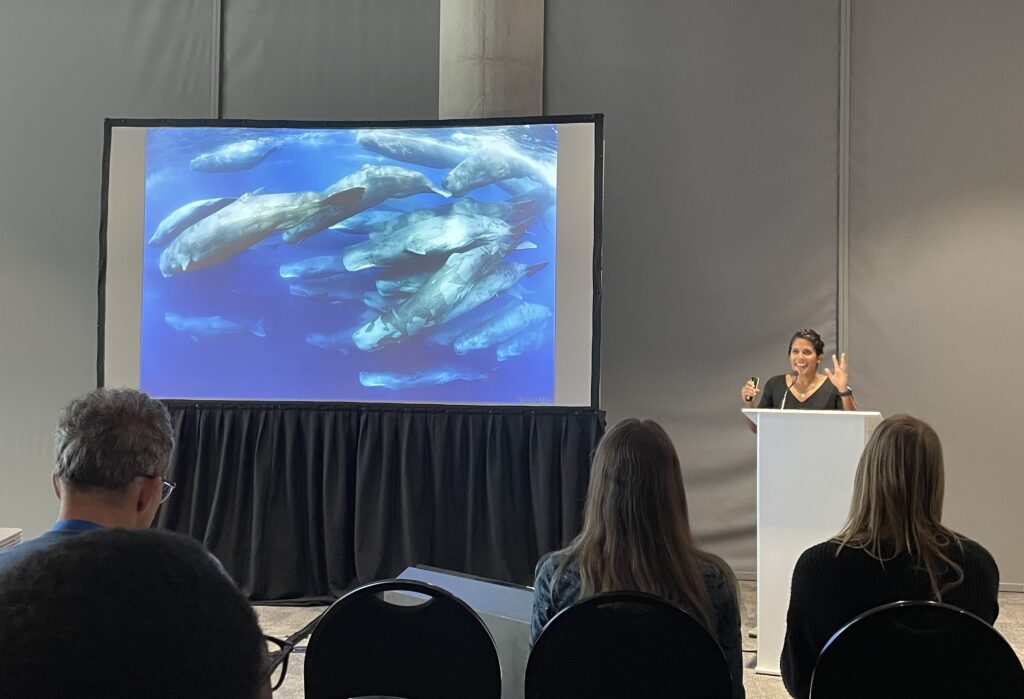
Elasmo Project Founder and MCAF Project Leader Dr. Rima Jabado gave a plenary talk on the state of sharks and rays. Dr. Jabado is also the deputy chair of The International Union for Conservation of Nature’s (IUCN) Species Survival Commission (SSC) and chair of the IUCN SSC Shark Specialist Group. Dr. Jabado laid out the trajectory of the escalating biodiversity crisis, highlighting the extended time it will take for shark and ray species to recover, even in best case scenarios. Acknowledging the hard work of conservationists over the past three decades, she shared her belief that positive change is possible with thoughtful science and policy.
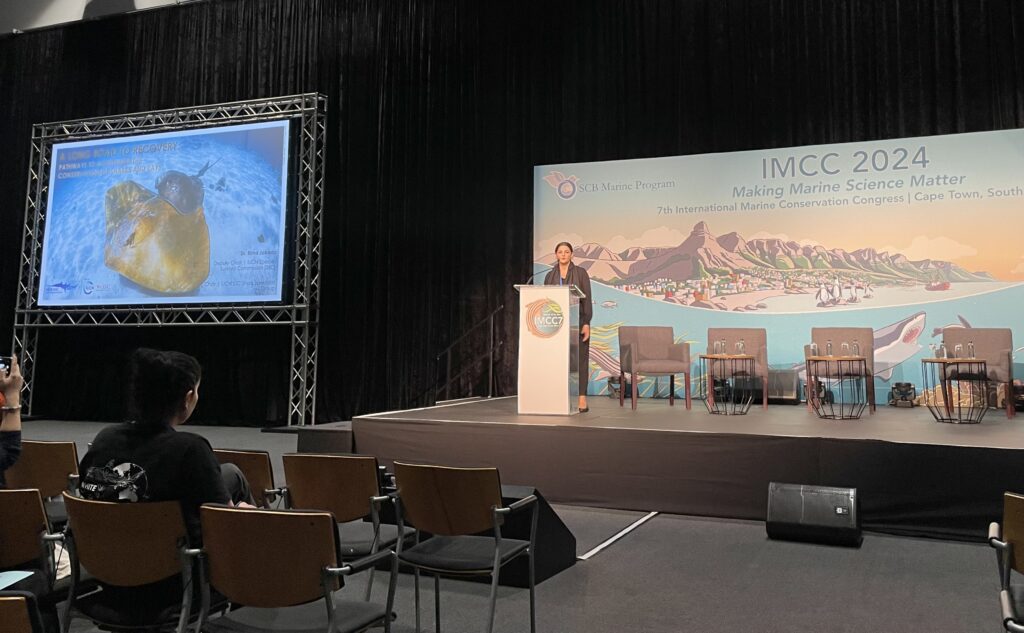
And the penguins?
Before we flew home, we were fortunate to participate in one of the IMCC-organized field trips to the Southern African Foundation for the Conservation of Coastal Birds (SANCCOB) rehabilitation center. SANCCOB’s flagship species is the critically endangered African penguin, which we are grateful to care for in our exhibits at the New England Aquarium back in Boston.
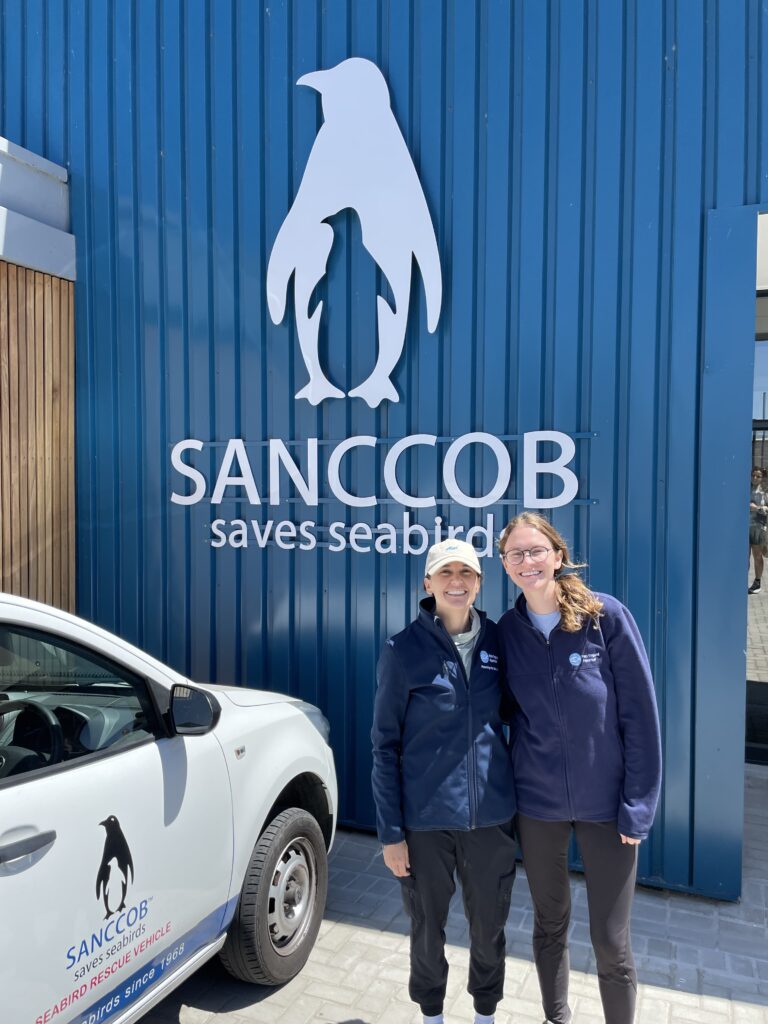
To support wild populations of one of the Aquarium’s iconic species, MCAF contributed to SANCCOB’s efforts this past summer to rescue, hand-rear, and release more than 25 eggs and 40 chicks that had been abandoned during heavy storms. SANCCOB clinical vet Dr. David Roberts explained that the slight shift in weather patterns due to climate change are causing more and more African penguins to abandon their nests when flooding occurs. We were thrilled to hear that the group of eggs and chicks MCAF helped support were already released back into the wild after a few months at the center!

It was a gift to see African penguins being cared for by SANCCOB and in the wild at Boulders Beach near Simon’s Town. We are energized by the entire IMCC experience and excited to incorporate our new professional connections and personal reflections from the week into the MCAF community and our team’s administrative practices.
/



